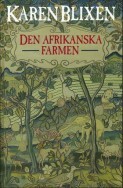You need to sign in or sign up before continuing.
Take a photo of a barcode or cover
I was surprised to be bored by this book. I expected the pace to be much faster - I guess we all get a little spoiled by seeing the movie first. I'm usually the other way around, junking the movie once I've read the book. I don't think I finished this but someday I may sit down and give it another go.
Smuk beskrivelse af Afrika set med Karen Blixens øjne i starten af 1900 tallet. Smukt!
Dinesen's thought as preparing to leave Africa: It is more than their land that you take away from the people whose native land you take. You take their past, their roots and their identity.
A beautiful read! A book written by Karen Blixen under her pen name Isak Dinesen. From the first sentence. “I had a farm in Africa at the foot fo the Ngong Hills” it had my full attention. This book describes her love of her farm in Africa, the native Africans who become her close friends, the antelope she adopted and the loss of friends. A couple of times she noted upon the deaths of friend that the “world had changed” after their deaths. She talks of her relationship and friendship to Denys Finch-Hatton and her deep love for him. Her descriptions of the landscape, the beauty of the animals, the people and the farm itself were breath taking. She talks of oral vs written traditions and what is lost with each advancement. Karen Blixen was a storyteller for the ages. What an gorgeous read.
I picked this up on a whim and I'm so glad I did. Karen Blixen moved from Denmark to Kenya in 1913 to run a coffee plantation with her husband (who, magnificently, she fails to mention in this book until after page 300. There are only 336 pages in total, in my edition.) This is a collection of her writing about the farm, her experiences with the Kikuyu people who worked for her and those who didn't, and with the Masai who lived in the Reserve that bordered her property. It is, of course, a record of a vanished way of life: as a farmer, she shoots any and all lions, which one can hardly imagine a landowner getting away with now. There is also a certain level of paternalism with regards to her musings about "Natives", even though she clearly respects the individual men and women who work for her, and they were obviously fond of her. On the whole, though, the impression is of a woman almost totally without ego - she wants to describe Africa, not to foreground her personality - and deeply observant. She is also, to my surprise, highly spiritual; a section late on in the book consists of short segments that often focus on the presence of God in the beauty of the natural world. Her sensibilities are deeply literary and allusive, and as a European aristocrat, she moved casually in the circles of high society (she talks of the Prince of Wales having dinner at her house, and she was extremely close with Denys Finch-Hatton, eventually having an affair with him after her divorce). She could also write with an extreme simplicity and clarity which seems characteristic of her time: "I had a farm in Africa," the book begins, "at the foot of the Ngong Hills." That sentence speaks directly to you; it's rhythmic, even musical. Outstanding.
Autobiografisena teoksena luettuna Blixenin kirja jättää liikaa pois, mutta autofiktiona osaan arvostaa sitä enemmän. Taidolla on jätetty kohtia pois tarinasta ja käytetty symboliikkaa niin että se herää fiktioksi, mutta silti siinä on riittävästi omaelämäkerrallisuutta. Out of Africa on minän uudelleenrakennus kuusi vuotta sen jälkeen, kun sekä rakkauselämä että liiketoimi Afrikassa ovat epäonnistuneet pahasti. Ehkä siksi päähenkilö on kirjoitettu vaikeuksiensa (ja muiden) yläpuolelle, sankarilliseksi paronittareksi (vrt. Isak Dinesen/Karen Blixen/Tania). Vaan edessä oli vielä toinen maailmansota ja Tanskan miehitys!
Kirja ei oikeastaan lainkaan sovi enää nykylukijalle, vaikka se onkin matkakertomuksena Afrikasta sinänsä romanttinen ja viehättävä. Lukija kuitenkin tietää liian paljon enemmän kuin kertoja: Kirja on hyvin syvällä tapaa rasistinen, ja minäkertojan selittely-yritykset näkee helposti, jos tulee 2000-luvulta, Karen.
Tahattomia ajatuksia: Alluusio konfliktista vanhojen feministien ja intersektionalistien välillä? Ja kun alkuasukkaita ja eläimiä rinnastetaan, tämä voisi olla 2020-lukulaista eläintalouden kritiikkiä?
Kirja ei oikeastaan lainkaan sovi enää nykylukijalle, vaikka se onkin matkakertomuksena Afrikasta sinänsä romanttinen ja viehättävä. Lukija kuitenkin tietää liian paljon enemmän kuin kertoja: Kirja on hyvin syvällä tapaa rasistinen, ja minäkertojan selittely-yritykset näkee helposti, jos tulee 2000-luvulta, Karen.
Tahattomia ajatuksia: Alluusio konfliktista vanhojen feministien ja intersektionalistien välillä? Ja kun alkuasukkaita ja eläimiä rinnastetaan, tämä voisi olla 2020-lukulaista eläintalouden kritiikkiä?
Devorei o livro. Não me lembro muito do filme, mas tinha a ideia que a história era centrada num romance. Depois de ler o livro, nem dei conta disso. Trata-se de um livro de memorias sobre o quotidiano colonialista, um retrato de uma época, mas também sobre a cultura dos povos locais.
"There was no fat on it and no luxuriousness anywhere; it was Africa distilled up through 6,000 feet, like the strong refined essence of a continent". This book delivers imagery that feels expansive, vivid and true.




